Analyzing the UK's Ageing Population's Impact on Healthcare Costs
VerifiedAdded on 2022/01/20
|10
|2896
|329
Essay
AI Summary
This essay delves into the escalating healthcare and social care costs within the United Kingdom, attributing the rise to the country's ageing population. The paper explores the demographic shift, characterized by a growing number of older adults and a declining birth rate, which strains healthcare resources. It examines the financial implications, citing rising health expenditures and the disproportionate costs associated with treating the elderly. The essay further investigates the societal impact, discussing the strain on public funds, the need for increased social care, and the potential economic consequences, such as reduced workforce participation and GDP growth. It also addresses the ethical considerations of funding care for the elderly, considering societal benefits, inequalities, and the importance of providing support. The essay concludes by highlighting the unsustainable nature of these costs and the need for comprehensive strategies to manage the challenges posed by the ageing population.
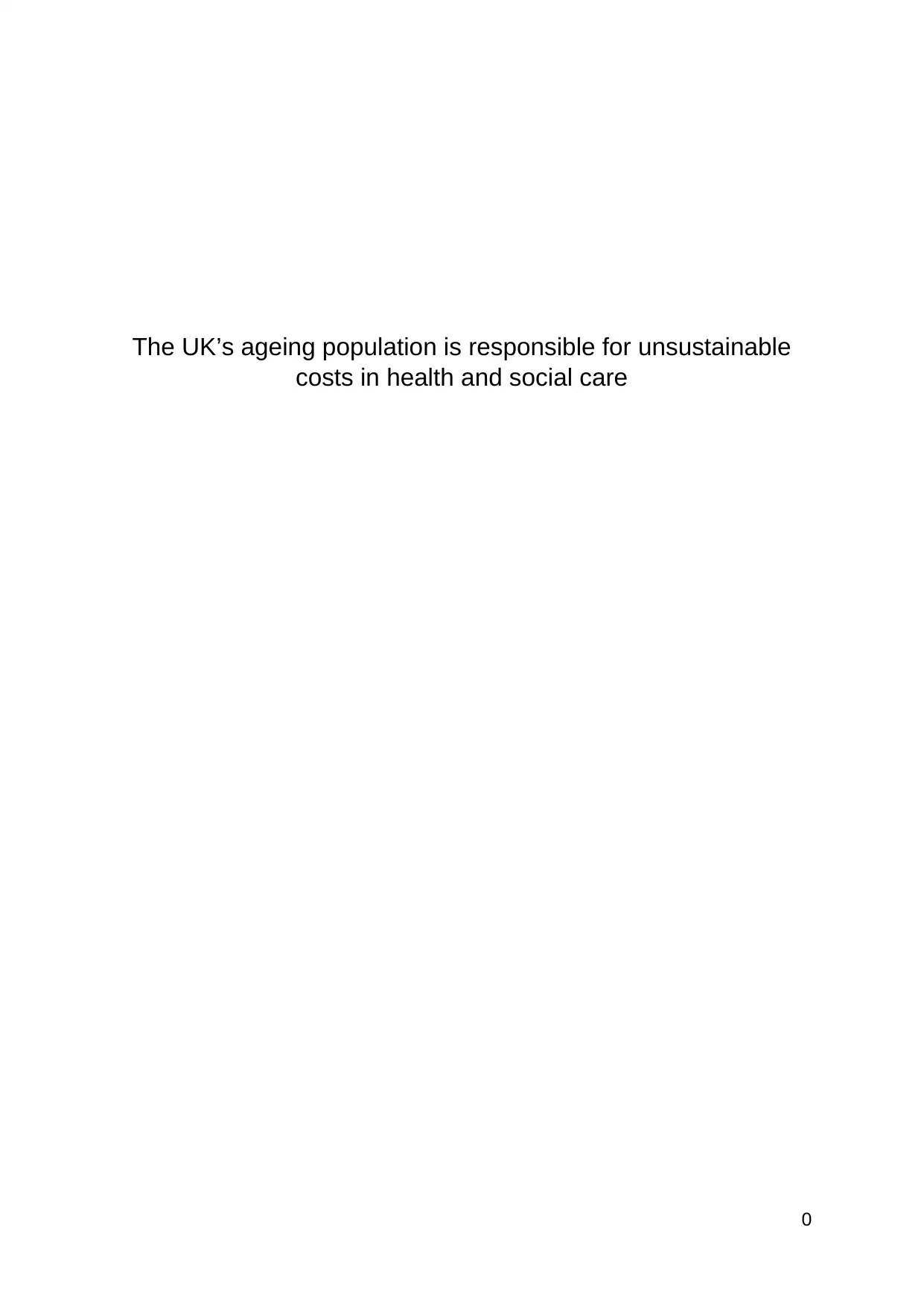
The UK’s ageing population is responsible for unsustainable
costs in health and social care
0
costs in health and social care
0
Paraphrase This Document
Need a fresh take? Get an instant paraphrase of this document with our AI Paraphraser
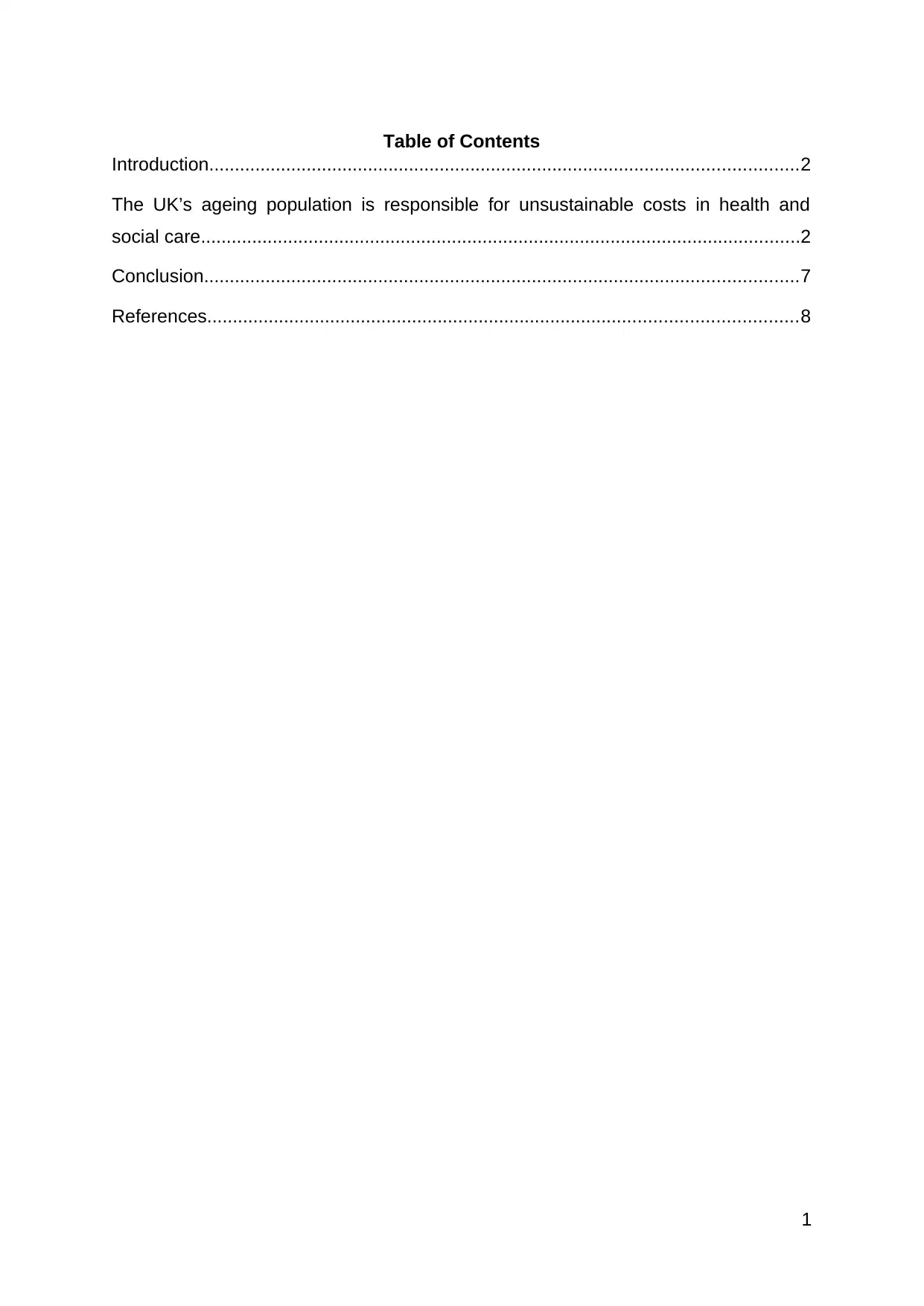
Table of Contents
Introduction...................................................................................................................2
The UK’s ageing population is responsible for unsustainable costs in health and
social care.....................................................................................................................2
Conclusion....................................................................................................................7
References...................................................................................................................8
1
Introduction...................................................................................................................2
The UK’s ageing population is responsible for unsustainable costs in health and
social care.....................................................................................................................2
Conclusion....................................................................................................................7
References...................................................................................................................8
1
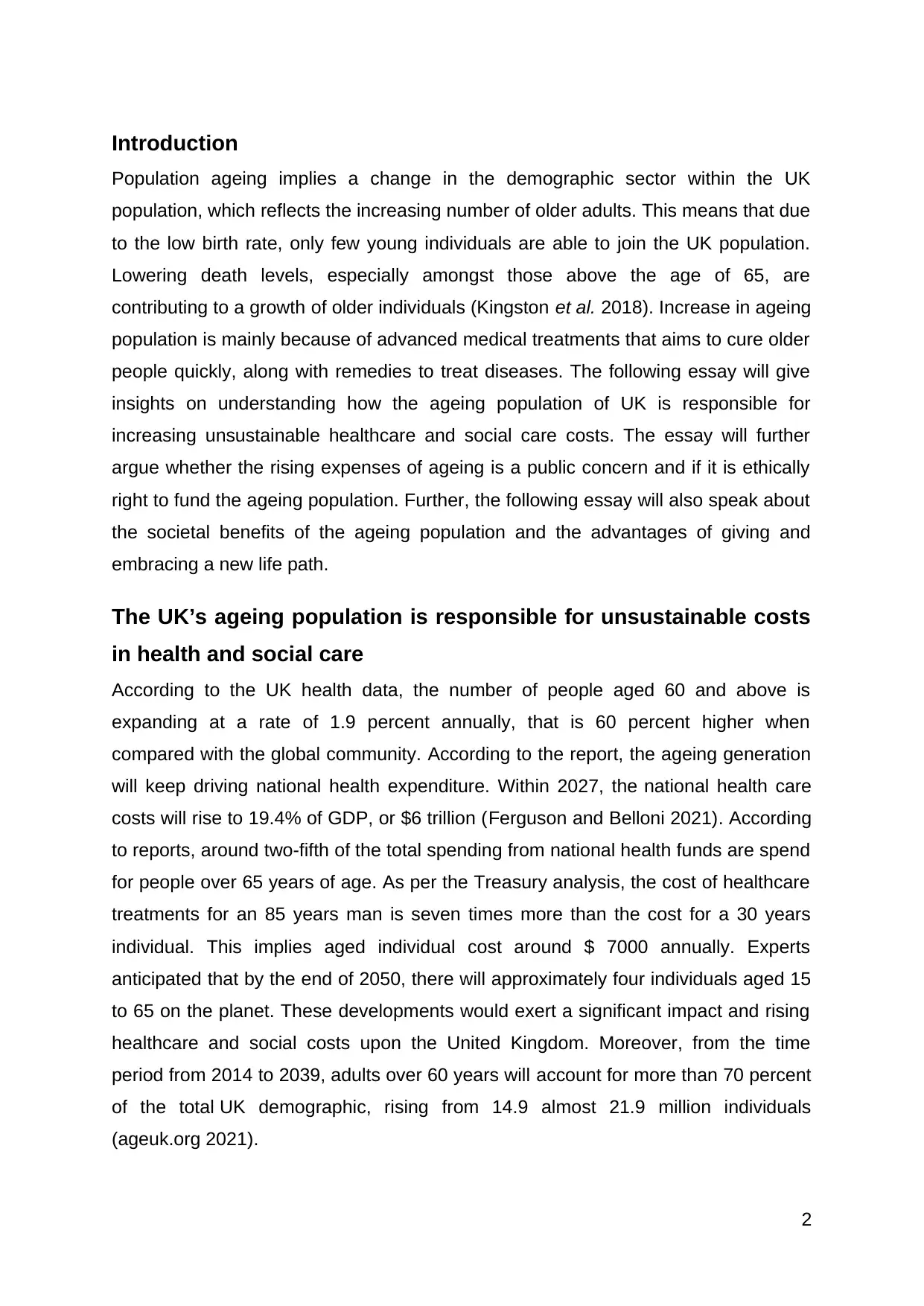
Introduction
Population ageing implies a change in the demographic sector within the UK
population, which reflects the increasing number of older adults. This means that due
to the low birth rate, only few young individuals are able to join the UK population.
Lowering death levels, especially amongst those above the age of 65, are
contributing to a growth of older individuals (Kingston et al. 2018). Increase in ageing
population is mainly because of advanced medical treatments that aims to cure older
people quickly, along with remedies to treat diseases. The following essay will give
insights on understanding how the ageing population of UK is responsible for
increasing unsustainable healthcare and social care costs. The essay will further
argue whether the rising expenses of ageing is a public concern and if it is ethically
right to fund the ageing population. Further, the following essay will also speak about
the societal benefits of the ageing population and the advantages of giving and
embracing a new life path.
The UK’s ageing population is responsible for unsustainable costs
in health and social care
According to the UK health data, the number of people aged 60 and above is
expanding at a rate of 1.9 percent annually, that is 60 percent higher when
compared with the global community. According to the report, the ageing generation
will keep driving national health expenditure. Within 2027, the national health care
costs will rise to 19.4% of GDP, or $6 trillion (Ferguson and Belloni 2021). According
to reports, around two-fifth of the total spending from national health funds are spend
for people over 65 years of age. As per the Treasury analysis, the cost of healthcare
treatments for an 85 years man is seven times more than the cost for a 30 years
individual. This implies aged individual cost around $ 7000 annually. Experts
anticipated that by the end of 2050, there will approximately four individuals aged 15
to 65 on the planet. These developments would exert a significant impact and rising
healthcare and social costs upon the United Kingdom. Moreover, from the time
period from 2014 to 2039, adults over 60 years will account for more than 70 percent
of the total UK demographic, rising from 14.9 almost 21.9 million individuals
(ageuk.org 2021).
2
Population ageing implies a change in the demographic sector within the UK
population, which reflects the increasing number of older adults. This means that due
to the low birth rate, only few young individuals are able to join the UK population.
Lowering death levels, especially amongst those above the age of 65, are
contributing to a growth of older individuals (Kingston et al. 2018). Increase in ageing
population is mainly because of advanced medical treatments that aims to cure older
people quickly, along with remedies to treat diseases. The following essay will give
insights on understanding how the ageing population of UK is responsible for
increasing unsustainable healthcare and social care costs. The essay will further
argue whether the rising expenses of ageing is a public concern and if it is ethically
right to fund the ageing population. Further, the following essay will also speak about
the societal benefits of the ageing population and the advantages of giving and
embracing a new life path.
The UK’s ageing population is responsible for unsustainable costs
in health and social care
According to the UK health data, the number of people aged 60 and above is
expanding at a rate of 1.9 percent annually, that is 60 percent higher when
compared with the global community. According to the report, the ageing generation
will keep driving national health expenditure. Within 2027, the national health care
costs will rise to 19.4% of GDP, or $6 trillion (Ferguson and Belloni 2021). According
to reports, around two-fifth of the total spending from national health funds are spend
for people over 65 years of age. As per the Treasury analysis, the cost of healthcare
treatments for an 85 years man is seven times more than the cost for a 30 years
individual. This implies aged individual cost around $ 7000 annually. Experts
anticipated that by the end of 2050, there will approximately four individuals aged 15
to 65 on the planet. These developments would exert a significant impact and rising
healthcare and social costs upon the United Kingdom. Moreover, from the time
period from 2014 to 2039, adults over 60 years will account for more than 70 percent
of the total UK demographic, rising from 14.9 almost 21.9 million individuals
(ageuk.org 2021).
2
⊘ This is a preview!⊘
Do you want full access?
Subscribe today to unlock all pages.

Trusted by 1+ million students worldwide
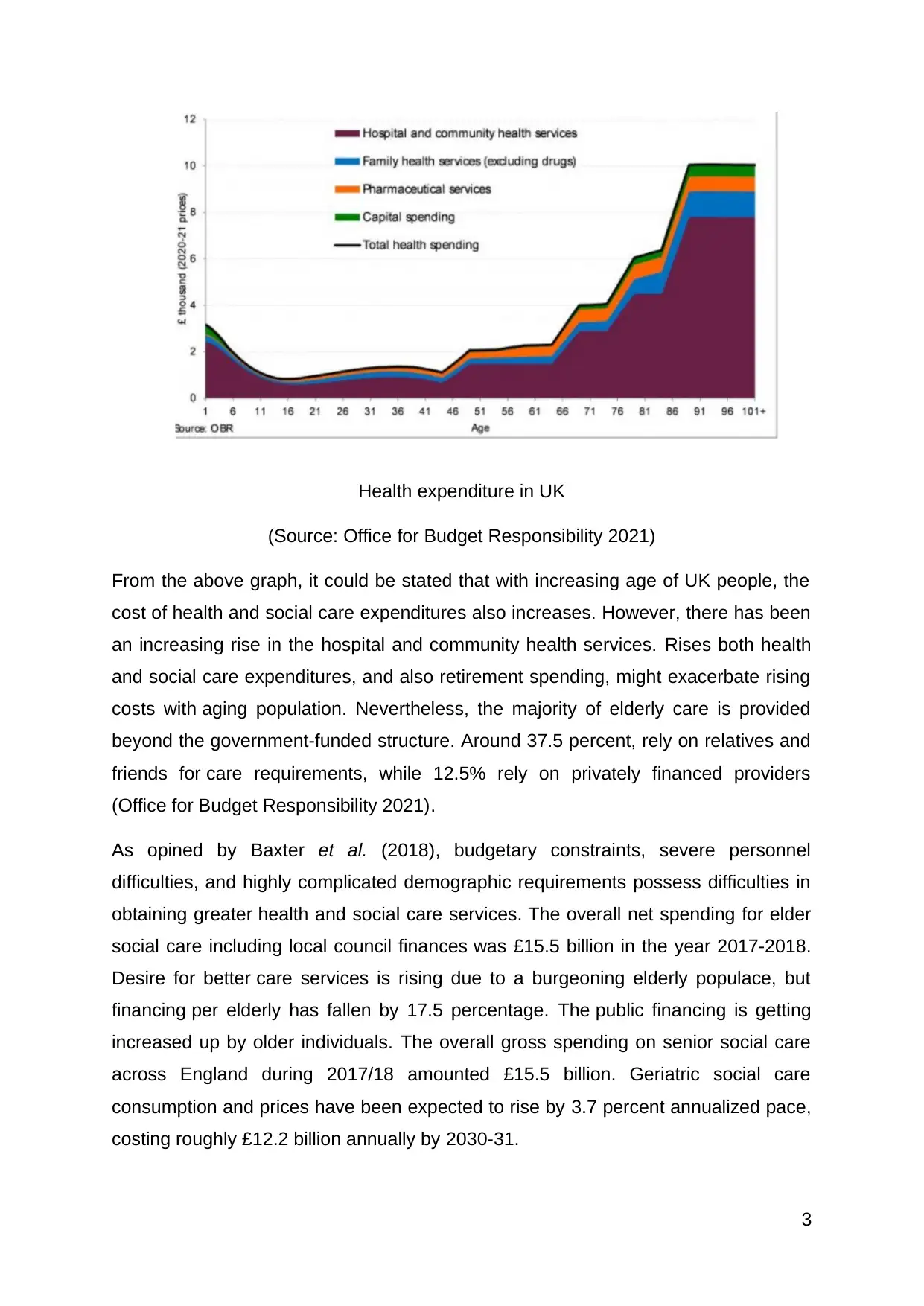
Health expenditure in UK
(Source: Office for Budget Responsibility 2021)
From the above graph, it could be stated that with increasing age of UK people, the
cost of health and social care expenditures also increases. However, there has been
an increasing rise in the hospital and community health services. Rises both health
and social care expenditures, and also retirement spending, might exacerbate rising
costs with aging population. Nevertheless, the majority of elderly care is provided
beyond the government-funded structure. Around 37.5 percent, rely on relatives and
friends for care requirements, while 12.5% rely on privately financed providers
(Office for Budget Responsibility 2021).
As opined by Baxter et al. (2018), budgetary constraints, severe personnel
difficulties, and highly complicated demographic requirements possess difficulties in
obtaining greater health and social care services. The overall net spending for elder
social care including local council finances was £15.5 billion in the year 2017-2018.
Desire for better care services is rising due to a burgeoning elderly populace, but
financing per elderly has fallen by 17.5 percentage. The public financing is getting
increased up by older individuals. The overall gross spending on senior social care
across England during 2017/18 amounted £15.5 billion. Geriatric social care
consumption and prices have been expected to rise by 3.7 percent annualized pace,
costing roughly £12.2 billion annually by 2030-31.
3
(Source: Office for Budget Responsibility 2021)
From the above graph, it could be stated that with increasing age of UK people, the
cost of health and social care expenditures also increases. However, there has been
an increasing rise in the hospital and community health services. Rises both health
and social care expenditures, and also retirement spending, might exacerbate rising
costs with aging population. Nevertheless, the majority of elderly care is provided
beyond the government-funded structure. Around 37.5 percent, rely on relatives and
friends for care requirements, while 12.5% rely on privately financed providers
(Office for Budget Responsibility 2021).
As opined by Baxter et al. (2018), budgetary constraints, severe personnel
difficulties, and highly complicated demographic requirements possess difficulties in
obtaining greater health and social care services. The overall net spending for elder
social care including local council finances was £15.5 billion in the year 2017-2018.
Desire for better care services is rising due to a burgeoning elderly populace, but
financing per elderly has fallen by 17.5 percentage. The public financing is getting
increased up by older individuals. The overall gross spending on senior social care
across England during 2017/18 amounted £15.5 billion. Geriatric social care
consumption and prices have been expected to rise by 3.7 percent annualized pace,
costing roughly £12.2 billion annually by 2030-31.
3
Paraphrase This Document
Need a fresh take? Get an instant paraphrase of this document with our AI Paraphraser
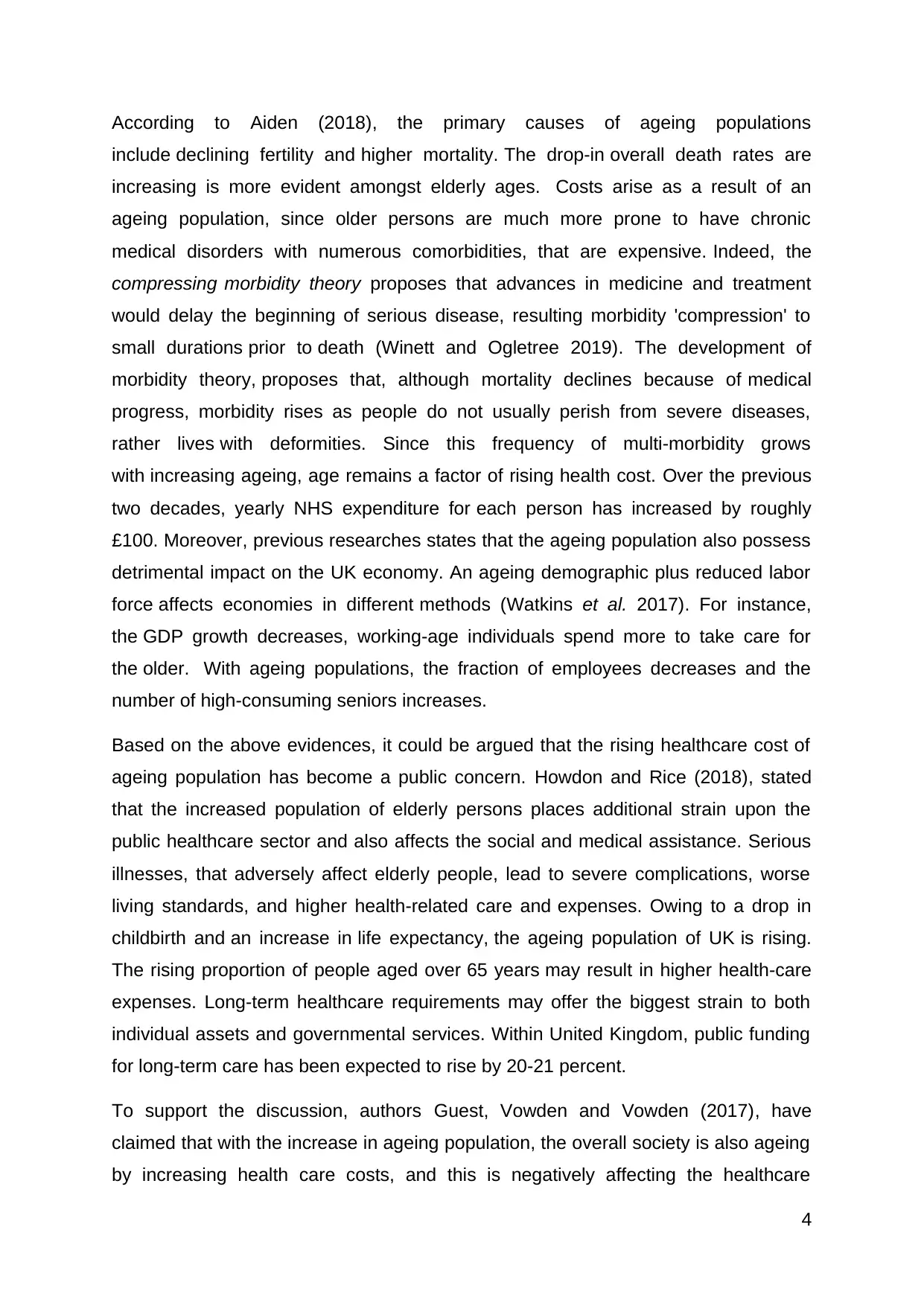
According to Aiden (2018), the primary causes of ageing populations
include declining fertility and higher mortality. The drop-in overall death rates are
increasing is more evident amongst elderly ages. Costs arise as a result of an
ageing population, since older persons are much more prone to have chronic
medical disorders with numerous comorbidities, that are expensive. Indeed, the
compressing morbidity theory proposes that advances in medicine and treatment
would delay the beginning of serious disease, resulting morbidity 'compression' to
small durations prior to death (Winett and Ogletree 2019). The development of
morbidity theory, proposes that, although mortality declines because of medical
progress, morbidity rises as people do not usually perish from severe diseases,
rather lives with deformities. Since this frequency of multi-morbidity grows
with increasing ageing, age remains a factor of rising health cost. Over the previous
two decades, yearly NHS expenditure for each person has increased by roughly
£100. Moreover, previous researches states that the ageing population also possess
detrimental impact on the UK economy. An ageing demographic plus reduced labor
force affects economies in different methods (Watkins et al. 2017). For instance,
the GDP growth decreases, working-age individuals spend more to take care for
the older. With ageing populations, the fraction of employees decreases and the
number of high-consuming seniors increases.
Based on the above evidences, it could be argued that the rising healthcare cost of
ageing population has become a public concern. Howdon and Rice (2018), stated
that the increased population of elderly persons places additional strain upon the
public healthcare sector and also affects the social and medical assistance. Serious
illnesses, that adversely affect elderly people, lead to severe complications, worse
living standards, and higher health-related care and expenses. Owing to a drop in
childbirth and an increase in life expectancy, the ageing population of UK is rising.
The rising proportion of people aged over 65 years may result in higher health-care
expenses. Long-term healthcare requirements may offer the biggest strain to both
individual assets and governmental services. Within United Kingdom, public funding
for long-term care has been expected to rise by 20-21 percent.
To support the discussion, authors Guest, Vowden and Vowden (2017), have
claimed that with the increase in ageing population, the overall society is also ageing
by increasing health care costs, and this is negatively affecting the healthcare
4
include declining fertility and higher mortality. The drop-in overall death rates are
increasing is more evident amongst elderly ages. Costs arise as a result of an
ageing population, since older persons are much more prone to have chronic
medical disorders with numerous comorbidities, that are expensive. Indeed, the
compressing morbidity theory proposes that advances in medicine and treatment
would delay the beginning of serious disease, resulting morbidity 'compression' to
small durations prior to death (Winett and Ogletree 2019). The development of
morbidity theory, proposes that, although mortality declines because of medical
progress, morbidity rises as people do not usually perish from severe diseases,
rather lives with deformities. Since this frequency of multi-morbidity grows
with increasing ageing, age remains a factor of rising health cost. Over the previous
two decades, yearly NHS expenditure for each person has increased by roughly
£100. Moreover, previous researches states that the ageing population also possess
detrimental impact on the UK economy. An ageing demographic plus reduced labor
force affects economies in different methods (Watkins et al. 2017). For instance,
the GDP growth decreases, working-age individuals spend more to take care for
the older. With ageing populations, the fraction of employees decreases and the
number of high-consuming seniors increases.
Based on the above evidences, it could be argued that the rising healthcare cost of
ageing population has become a public concern. Howdon and Rice (2018), stated
that the increased population of elderly persons places additional strain upon the
public healthcare sector and also affects the social and medical assistance. Serious
illnesses, that adversely affect elderly people, lead to severe complications, worse
living standards, and higher health-related care and expenses. Owing to a drop in
childbirth and an increase in life expectancy, the ageing population of UK is rising.
The rising proportion of people aged over 65 years may result in higher health-care
expenses. Long-term healthcare requirements may offer the biggest strain to both
individual assets and governmental services. Within United Kingdom, public funding
for long-term care has been expected to rise by 20-21 percent.
To support the discussion, authors Guest, Vowden and Vowden (2017), have
claimed that with the increase in ageing population, the overall society is also ageing
by increasing health care costs, and this is negatively affecting the healthcare
4
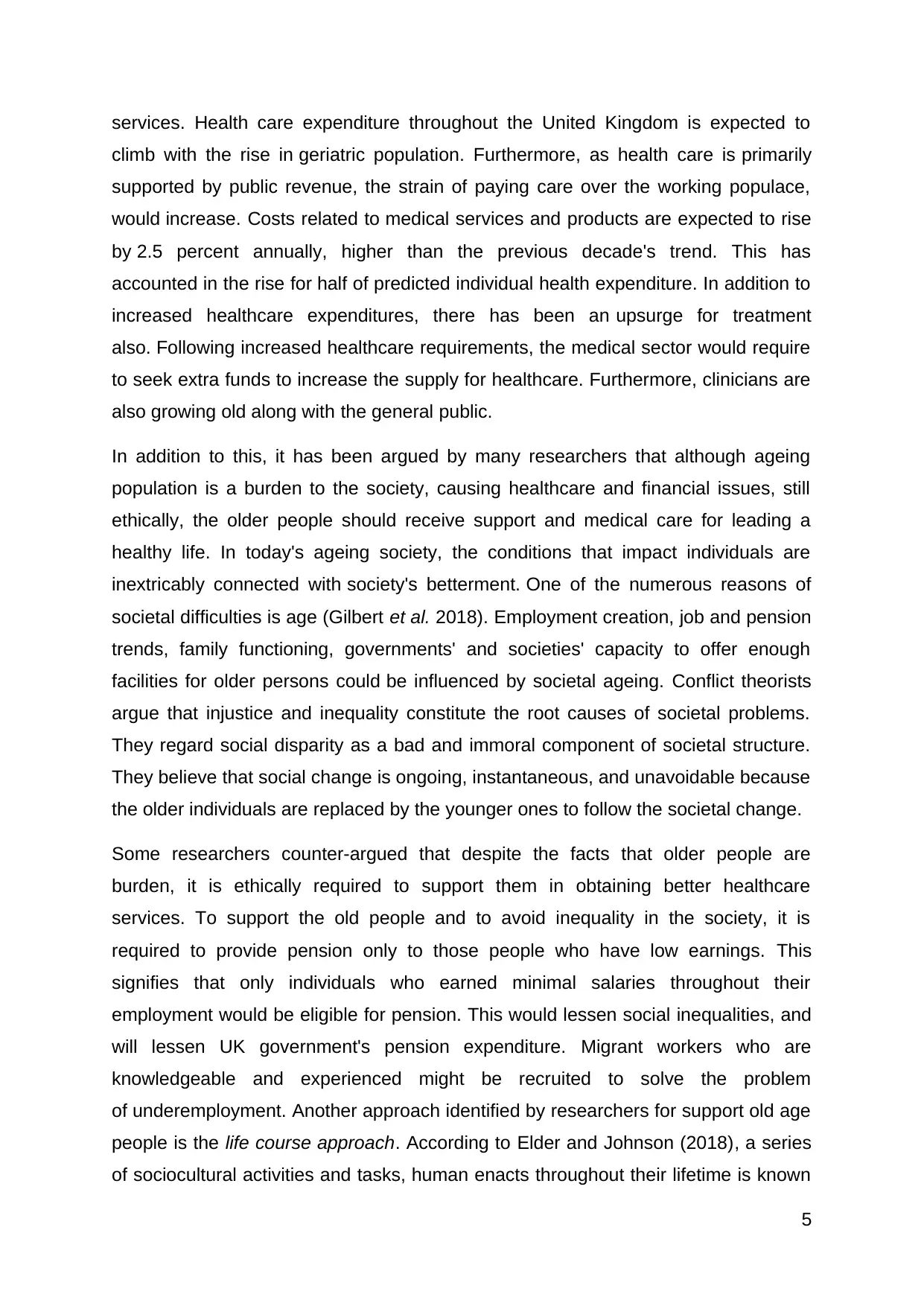
services. Health care expenditure throughout the United Kingdom is expected to
climb with the rise in geriatric population. Furthermore, as health care is primarily
supported by public revenue, the strain of paying care over the working populace,
would increase. Costs related to medical services and products are expected to rise
by 2.5 percent annually, higher than the previous decade's trend. This has
accounted in the rise for half of predicted individual health expenditure. In addition to
increased healthcare expenditures, there has been an upsurge for treatment
also. Following increased healthcare requirements, the medical sector would require
to seek extra funds to increase the supply for healthcare. Furthermore, clinicians are
also growing old along with the general public.
In addition to this, it has been argued by many researchers that although ageing
population is a burden to the society, causing healthcare and financial issues, still
ethically, the older people should receive support and medical care for leading a
healthy life. In today's ageing society, the conditions that impact individuals are
inextricably connected with society's betterment. One of the numerous reasons of
societal difficulties is age (Gilbert et al. 2018). Employment creation, job and pension
trends, family functioning, governments' and societies' capacity to offer enough
facilities for older persons could be influenced by societal ageing. Conflict theorists
argue that injustice and inequality constitute the root causes of societal problems.
They regard social disparity as a bad and immoral component of societal structure.
They believe that social change is ongoing, instantaneous, and unavoidable because
the older individuals are replaced by the younger ones to follow the societal change.
Some researchers counter-argued that despite the facts that older people are
burden, it is ethically required to support them in obtaining better healthcare
services. To support the old people and to avoid inequality in the society, it is
required to provide pension only to those people who have low earnings. This
signifies that only individuals who earned minimal salaries throughout their
employment would be eligible for pension. This would lessen social inequalities, and
will lessen UK government's pension expenditure. Migrant workers who are
knowledgeable and experienced might be recruited to solve the problem
of underemployment. Another approach identified by researchers for support old age
people is the life course approach. According to Elder and Johnson (2018), a series
of sociocultural activities and tasks, human enacts throughout their lifetime is known
5
climb with the rise in geriatric population. Furthermore, as health care is primarily
supported by public revenue, the strain of paying care over the working populace,
would increase. Costs related to medical services and products are expected to rise
by 2.5 percent annually, higher than the previous decade's trend. This has
accounted in the rise for half of predicted individual health expenditure. In addition to
increased healthcare expenditures, there has been an upsurge for treatment
also. Following increased healthcare requirements, the medical sector would require
to seek extra funds to increase the supply for healthcare. Furthermore, clinicians are
also growing old along with the general public.
In addition to this, it has been argued by many researchers that although ageing
population is a burden to the society, causing healthcare and financial issues, still
ethically, the older people should receive support and medical care for leading a
healthy life. In today's ageing society, the conditions that impact individuals are
inextricably connected with society's betterment. One of the numerous reasons of
societal difficulties is age (Gilbert et al. 2018). Employment creation, job and pension
trends, family functioning, governments' and societies' capacity to offer enough
facilities for older persons could be influenced by societal ageing. Conflict theorists
argue that injustice and inequality constitute the root causes of societal problems.
They regard social disparity as a bad and immoral component of societal structure.
They believe that social change is ongoing, instantaneous, and unavoidable because
the older individuals are replaced by the younger ones to follow the societal change.
Some researchers counter-argued that despite the facts that older people are
burden, it is ethically required to support them in obtaining better healthcare
services. To support the old people and to avoid inequality in the society, it is
required to provide pension only to those people who have low earnings. This
signifies that only individuals who earned minimal salaries throughout their
employment would be eligible for pension. This would lessen social inequalities, and
will lessen UK government's pension expenditure. Migrant workers who are
knowledgeable and experienced might be recruited to solve the problem
of underemployment. Another approach identified by researchers for support old age
people is the life course approach. According to Elder and Johnson (2018), a series
of sociocultural activities and tasks, human enacts throughout their lifetime is known
5
⊘ This is a preview!⊘
Do you want full access?
Subscribe today to unlock all pages.

Trusted by 1+ million students worldwide
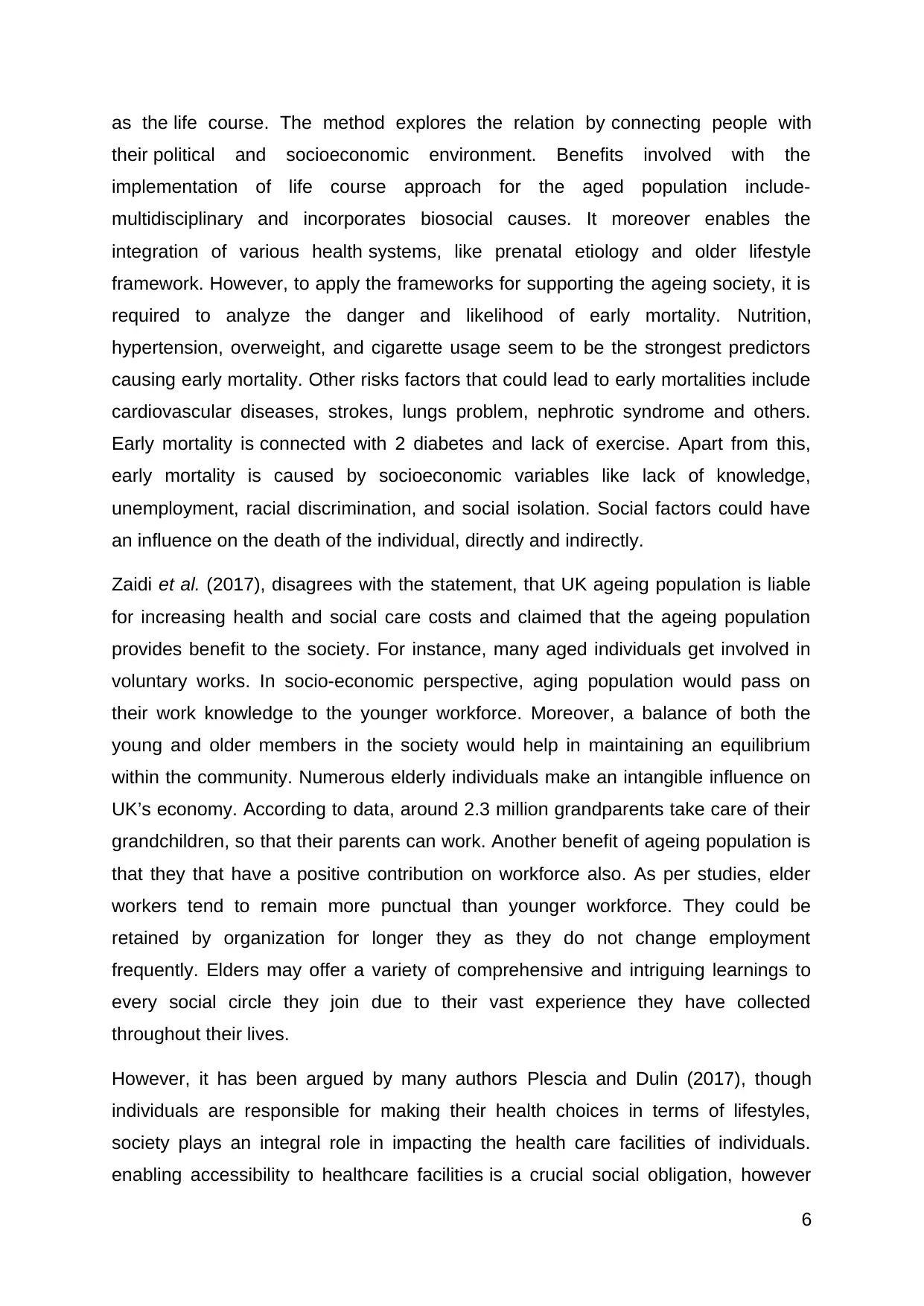
as the life course. The method explores the relation by connecting people with
their political and socioeconomic environment. Benefits involved with the
implementation of life course approach for the aged population include-
multidisciplinary and incorporates biosocial causes. It moreover enables the
integration of various health systems, like prenatal etiology and older lifestyle
framework. However, to apply the frameworks for supporting the ageing society, it is
required to analyze the danger and likelihood of early mortality. Nutrition,
hypertension, overweight, and cigarette usage seem to be the strongest predictors
causing early mortality. Other risks factors that could lead to early mortalities include
cardiovascular diseases, strokes, lungs problem, nephrotic syndrome and others.
Early mortality is connected with 2 diabetes and lack of exercise. Apart from this,
early mortality is caused by socioeconomic variables like lack of knowledge,
unemployment, racial discrimination, and social isolation. Social factors could have
an influence on the death of the individual, directly and indirectly.
Zaidi et al. (2017), disagrees with the statement, that UK ageing population is liable
for increasing health and social care costs and claimed that the ageing population
provides benefit to the society. For instance, many aged individuals get involved in
voluntary works. In socio-economic perspective, aging population would pass on
their work knowledge to the younger workforce. Moreover, a balance of both the
young and older members in the society would help in maintaining an equilibrium
within the community. Numerous elderly individuals make an intangible influence on
UK’s economy. According to data, around 2.3 million grandparents take care of their
grandchildren, so that their parents can work. Another benefit of ageing population is
that they that have a positive contribution on workforce also. As per studies, elder
workers tend to remain more punctual than younger workforce. They could be
retained by organization for longer they as they do not change employment
frequently. Elders may offer a variety of comprehensive and intriguing learnings to
every social circle they join due to their vast experience they have collected
throughout their lives.
However, it has been argued by many authors Plescia and Dulin (2017), though
individuals are responsible for making their health choices in terms of lifestyles,
society plays an integral role in impacting the health care facilities of individuals.
enabling accessibility to healthcare facilities is a crucial social obligation, however
6
their political and socioeconomic environment. Benefits involved with the
implementation of life course approach for the aged population include-
multidisciplinary and incorporates biosocial causes. It moreover enables the
integration of various health systems, like prenatal etiology and older lifestyle
framework. However, to apply the frameworks for supporting the ageing society, it is
required to analyze the danger and likelihood of early mortality. Nutrition,
hypertension, overweight, and cigarette usage seem to be the strongest predictors
causing early mortality. Other risks factors that could lead to early mortalities include
cardiovascular diseases, strokes, lungs problem, nephrotic syndrome and others.
Early mortality is connected with 2 diabetes and lack of exercise. Apart from this,
early mortality is caused by socioeconomic variables like lack of knowledge,
unemployment, racial discrimination, and social isolation. Social factors could have
an influence on the death of the individual, directly and indirectly.
Zaidi et al. (2017), disagrees with the statement, that UK ageing population is liable
for increasing health and social care costs and claimed that the ageing population
provides benefit to the society. For instance, many aged individuals get involved in
voluntary works. In socio-economic perspective, aging population would pass on
their work knowledge to the younger workforce. Moreover, a balance of both the
young and older members in the society would help in maintaining an equilibrium
within the community. Numerous elderly individuals make an intangible influence on
UK’s economy. According to data, around 2.3 million grandparents take care of their
grandchildren, so that their parents can work. Another benefit of ageing population is
that they that have a positive contribution on workforce also. As per studies, elder
workers tend to remain more punctual than younger workforce. They could be
retained by organization for longer they as they do not change employment
frequently. Elders may offer a variety of comprehensive and intriguing learnings to
every social circle they join due to their vast experience they have collected
throughout their lives.
However, it has been argued by many authors Plescia and Dulin (2017), though
individuals are responsible for making their health choices in terms of lifestyles,
society plays an integral role in impacting the health care facilities of individuals.
enabling accessibility to healthcare facilities is a crucial social obligation, however
6
Paraphrase This Document
Need a fresh take? Get an instant paraphrase of this document with our AI Paraphraser
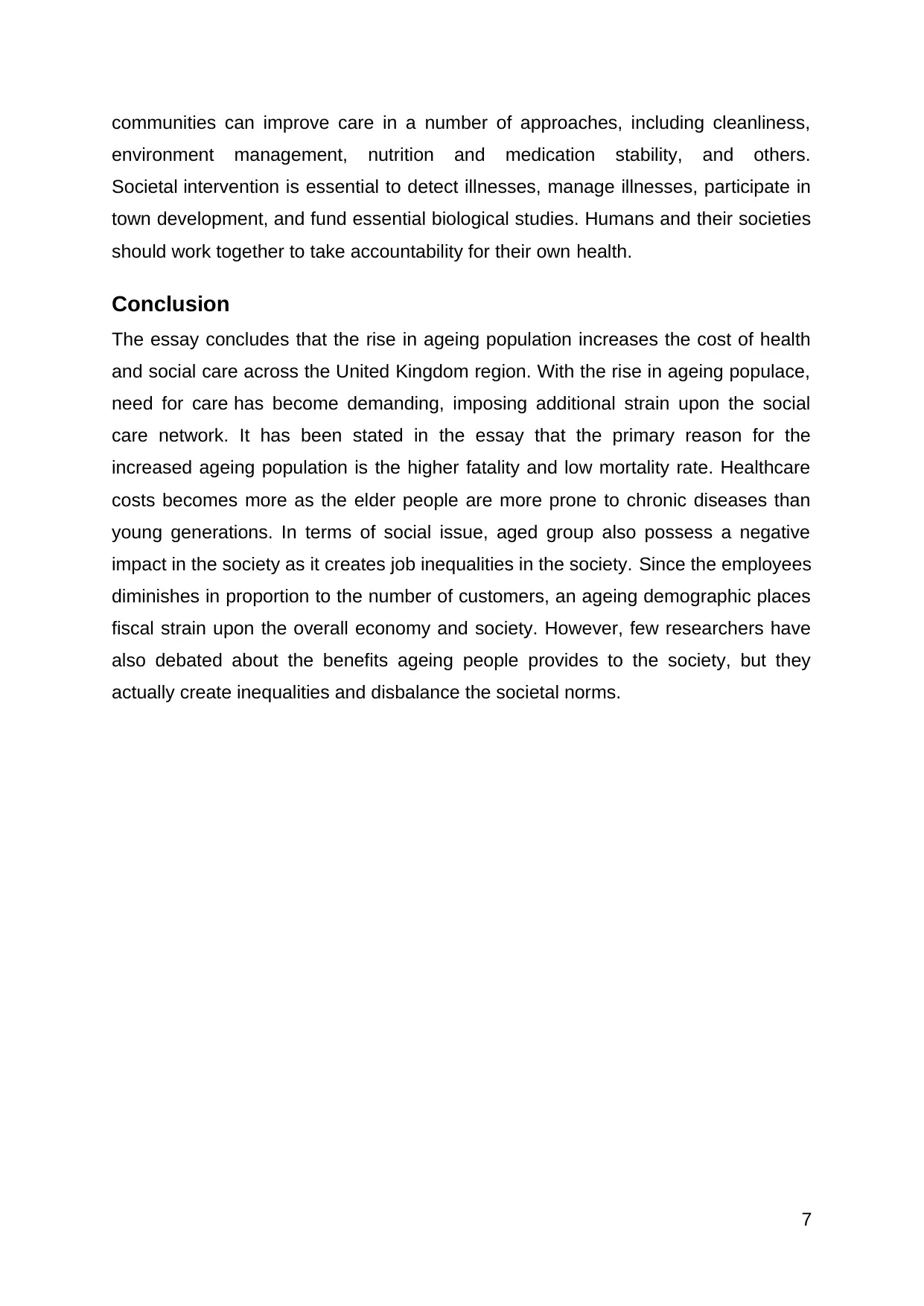
communities can improve care in a number of approaches, including cleanliness,
environment management, nutrition and medication stability, and others.
Societal intervention is essential to detect illnesses, manage illnesses, participate in
town development, and fund essential biological studies. Humans and their societies
should work together to take accountability for their own health.
Conclusion
The essay concludes that the rise in ageing population increases the cost of health
and social care across the United Kingdom region. With the rise in ageing populace,
need for care has become demanding, imposing additional strain upon the social
care network. It has been stated in the essay that the primary reason for the
increased ageing population is the higher fatality and low mortality rate. Healthcare
costs becomes more as the elder people are more prone to chronic diseases than
young generations. In terms of social issue, aged group also possess a negative
impact in the society as it creates job inequalities in the society. Since the employees
diminishes in proportion to the number of customers, an ageing demographic places
fiscal strain upon the overall economy and society. However, few researchers have
also debated about the benefits ageing people provides to the society, but they
actually create inequalities and disbalance the societal norms.
7
environment management, nutrition and medication stability, and others.
Societal intervention is essential to detect illnesses, manage illnesses, participate in
town development, and fund essential biological studies. Humans and their societies
should work together to take accountability for their own health.
Conclusion
The essay concludes that the rise in ageing population increases the cost of health
and social care across the United Kingdom region. With the rise in ageing populace,
need for care has become demanding, imposing additional strain upon the social
care network. It has been stated in the essay that the primary reason for the
increased ageing population is the higher fatality and low mortality rate. Healthcare
costs becomes more as the elder people are more prone to chronic diseases than
young generations. In terms of social issue, aged group also possess a negative
impact in the society as it creates job inequalities in the society. Since the employees
diminishes in proportion to the number of customers, an ageing demographic places
fiscal strain upon the overall economy and society. However, few researchers have
also debated about the benefits ageing people provides to the society, but they
actually create inequalities and disbalance the societal norms.
7
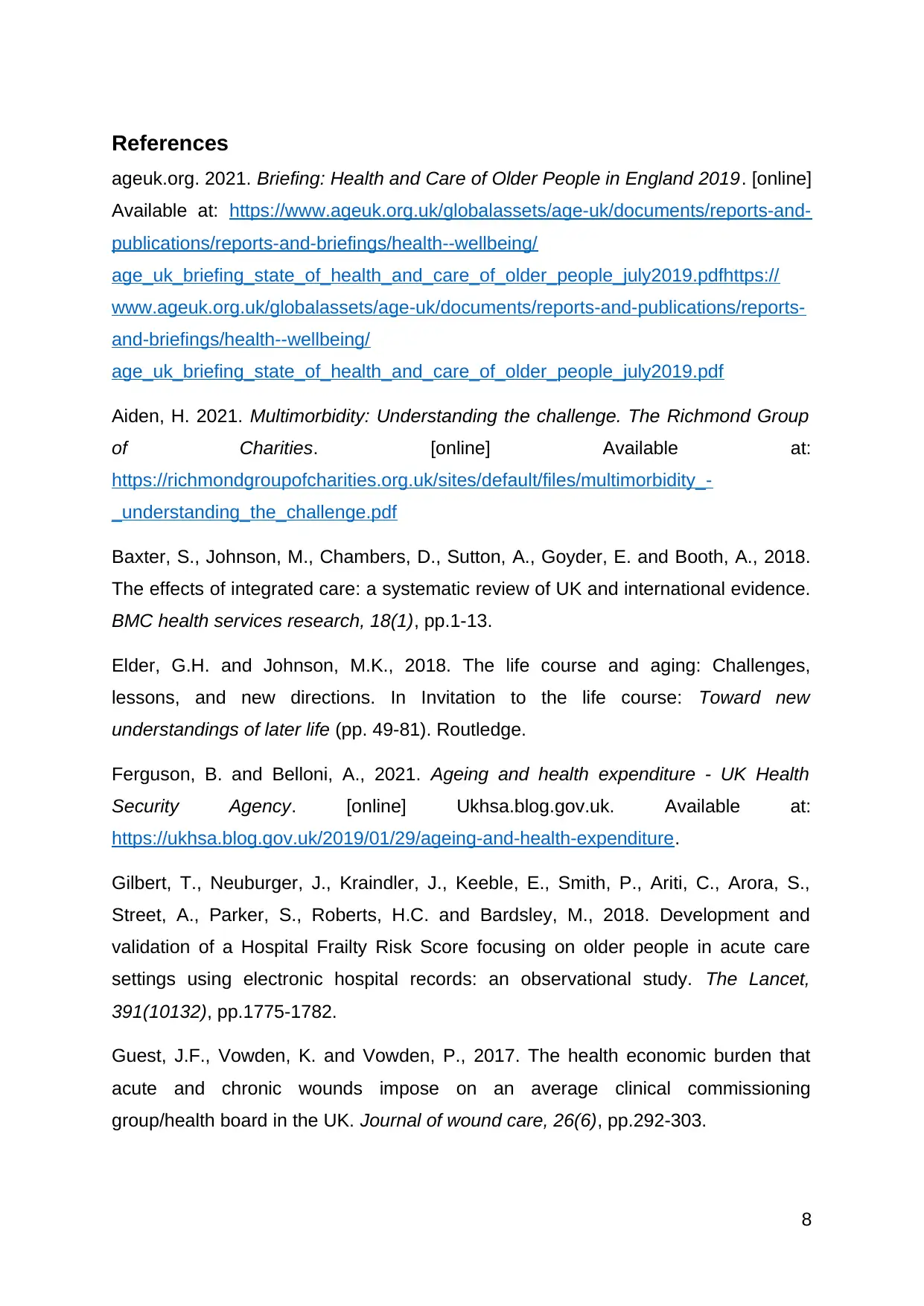
References
ageuk.org. 2021. Briefing: Health and Care of Older People in England 2019. [online]
Available at: https://www.ageuk.org.uk/globalassets/age-uk/documents/reports-and-
publications/reports-and-briefings/health--wellbeing/
age_uk_briefing_state_of_health_and_care_of_older_people_july2019.pdfhttps://
www.ageuk.org.uk/globalassets/age-uk/documents/reports-and-publications/reports-
and-briefings/health--wellbeing/
age_uk_briefing_state_of_health_and_care_of_older_people_july2019.pdf
Aiden, H. 2021. Multimorbidity: Understanding the challenge. The Richmond Group
of Charities. [online] Available at:
https://richmondgroupofcharities.org.uk/sites/default/files/multimorbidity_-
_understanding_the_challenge.pdf
Baxter, S., Johnson, M., Chambers, D., Sutton, A., Goyder, E. and Booth, A., 2018.
The effects of integrated care: a systematic review of UK and international evidence.
BMC health services research, 18(1), pp.1-13.
Elder, G.H. and Johnson, M.K., 2018. The life course and aging: Challenges,
lessons, and new directions. In Invitation to the life course: Toward new
understandings of later life (pp. 49-81). Routledge.
Ferguson, B. and Belloni, A., 2021. Ageing and health expenditure - UK Health
Security Agency. [online] Ukhsa.blog.gov.uk. Available at:
https://ukhsa.blog.gov.uk/2019/01/29/ageing-and-health-expenditure.
Gilbert, T., Neuburger, J., Kraindler, J., Keeble, E., Smith, P., Ariti, C., Arora, S.,
Street, A., Parker, S., Roberts, H.C. and Bardsley, M., 2018. Development and
validation of a Hospital Frailty Risk Score focusing on older people in acute care
settings using electronic hospital records: an observational study. The Lancet,
391(10132), pp.1775-1782.
Guest, J.F., Vowden, K. and Vowden, P., 2017. The health economic burden that
acute and chronic wounds impose on an average clinical commissioning
group/health board in the UK. Journal of wound care, 26(6), pp.292-303.
8
ageuk.org. 2021. Briefing: Health and Care of Older People in England 2019. [online]
Available at: https://www.ageuk.org.uk/globalassets/age-uk/documents/reports-and-
publications/reports-and-briefings/health--wellbeing/
age_uk_briefing_state_of_health_and_care_of_older_people_july2019.pdfhttps://
www.ageuk.org.uk/globalassets/age-uk/documents/reports-and-publications/reports-
and-briefings/health--wellbeing/
age_uk_briefing_state_of_health_and_care_of_older_people_july2019.pdf
Aiden, H. 2021. Multimorbidity: Understanding the challenge. The Richmond Group
of Charities. [online] Available at:
https://richmondgroupofcharities.org.uk/sites/default/files/multimorbidity_-
_understanding_the_challenge.pdf
Baxter, S., Johnson, M., Chambers, D., Sutton, A., Goyder, E. and Booth, A., 2018.
The effects of integrated care: a systematic review of UK and international evidence.
BMC health services research, 18(1), pp.1-13.
Elder, G.H. and Johnson, M.K., 2018. The life course and aging: Challenges,
lessons, and new directions. In Invitation to the life course: Toward new
understandings of later life (pp. 49-81). Routledge.
Ferguson, B. and Belloni, A., 2021. Ageing and health expenditure - UK Health
Security Agency. [online] Ukhsa.blog.gov.uk. Available at:
https://ukhsa.blog.gov.uk/2019/01/29/ageing-and-health-expenditure.
Gilbert, T., Neuburger, J., Kraindler, J., Keeble, E., Smith, P., Ariti, C., Arora, S.,
Street, A., Parker, S., Roberts, H.C. and Bardsley, M., 2018. Development and
validation of a Hospital Frailty Risk Score focusing on older people in acute care
settings using electronic hospital records: an observational study. The Lancet,
391(10132), pp.1775-1782.
Guest, J.F., Vowden, K. and Vowden, P., 2017. The health economic burden that
acute and chronic wounds impose on an average clinical commissioning
group/health board in the UK. Journal of wound care, 26(6), pp.292-303.
8
⊘ This is a preview!⊘
Do you want full access?
Subscribe today to unlock all pages.

Trusted by 1+ million students worldwide
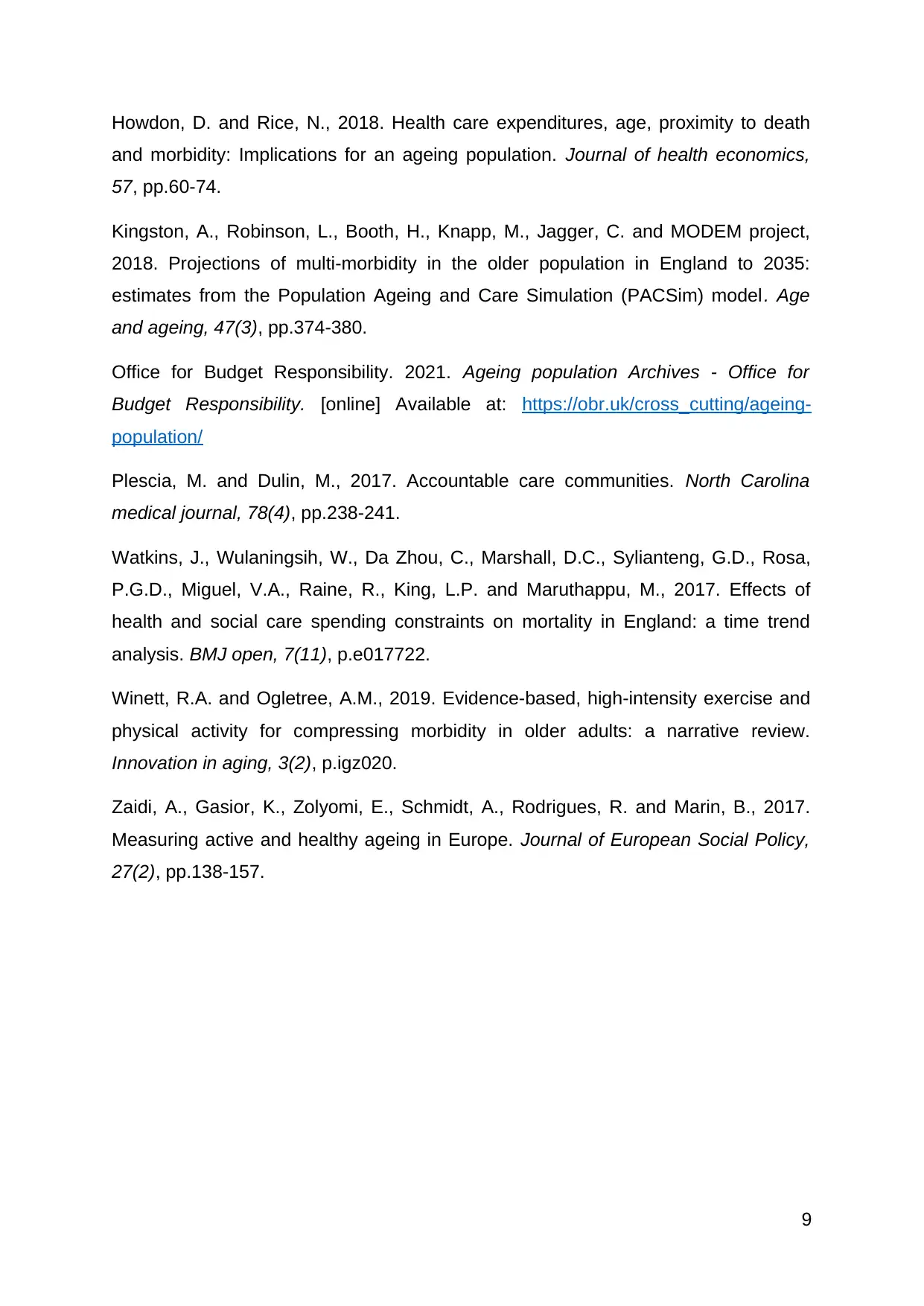
Howdon, D. and Rice, N., 2018. Health care expenditures, age, proximity to death
and morbidity: Implications for an ageing population. Journal of health economics,
57, pp.60-74.
Kingston, A., Robinson, L., Booth, H., Knapp, M., Jagger, C. and MODEM project,
2018. Projections of multi-morbidity in the older population in England to 2035:
estimates from the Population Ageing and Care Simulation (PACSim) model. Age
and ageing, 47(3), pp.374-380.
Office for Budget Responsibility. 2021. Ageing population Archives - Office for
Budget Responsibility. [online] Available at: https://obr.uk/cross_cutting/ageing-
population/
Plescia, M. and Dulin, M., 2017. Accountable care communities. North Carolina
medical journal, 78(4), pp.238-241.
Watkins, J., Wulaningsih, W., Da Zhou, C., Marshall, D.C., Sylianteng, G.D., Rosa,
P.G.D., Miguel, V.A., Raine, R., King, L.P. and Maruthappu, M., 2017. Effects of
health and social care spending constraints on mortality in England: a time trend
analysis. BMJ open, 7(11), p.e017722.
Winett, R.A. and Ogletree, A.M., 2019. Evidence-based, high-intensity exercise and
physical activity for compressing morbidity in older adults: a narrative review.
Innovation in aging, 3(2), p.igz020.
Zaidi, A., Gasior, K., Zolyomi, E., Schmidt, A., Rodrigues, R. and Marin, B., 2017.
Measuring active and healthy ageing in Europe. Journal of European Social Policy,
27(2), pp.138-157.
9
and morbidity: Implications for an ageing population. Journal of health economics,
57, pp.60-74.
Kingston, A., Robinson, L., Booth, H., Knapp, M., Jagger, C. and MODEM project,
2018. Projections of multi-morbidity in the older population in England to 2035:
estimates from the Population Ageing and Care Simulation (PACSim) model. Age
and ageing, 47(3), pp.374-380.
Office for Budget Responsibility. 2021. Ageing population Archives - Office for
Budget Responsibility. [online] Available at: https://obr.uk/cross_cutting/ageing-
population/
Plescia, M. and Dulin, M., 2017. Accountable care communities. North Carolina
medical journal, 78(4), pp.238-241.
Watkins, J., Wulaningsih, W., Da Zhou, C., Marshall, D.C., Sylianteng, G.D., Rosa,
P.G.D., Miguel, V.A., Raine, R., King, L.P. and Maruthappu, M., 2017. Effects of
health and social care spending constraints on mortality in England: a time trend
analysis. BMJ open, 7(11), p.e017722.
Winett, R.A. and Ogletree, A.M., 2019. Evidence-based, high-intensity exercise and
physical activity for compressing morbidity in older adults: a narrative review.
Innovation in aging, 3(2), p.igz020.
Zaidi, A., Gasior, K., Zolyomi, E., Schmidt, A., Rodrigues, R. and Marin, B., 2017.
Measuring active and healthy ageing in Europe. Journal of European Social Policy,
27(2), pp.138-157.
9
1 out of 10
Related Documents
Your All-in-One AI-Powered Toolkit for Academic Success.
+13062052269
info@desklib.com
Available 24*7 on WhatsApp / Email
![[object Object]](/_next/static/media/star-bottom.7253800d.svg)
Unlock your academic potential
Copyright © 2020–2025 A2Z Services. All Rights Reserved. Developed and managed by ZUCOL.





